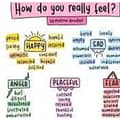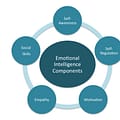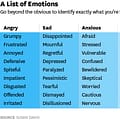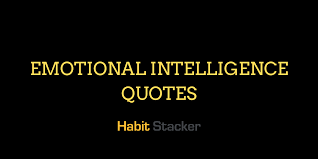Your Intelligence and cognitive abilities are essential for you to get a job or Promotion to a Managerial or Leadership Position.
But the challenge lies in sustaining yourself in the position once you get there!
Your responsibilities as a New Manager Or Leader increase in the new role and you need to grow and evolve out of your old thinking and doing ways.
With changes sweeping the business world at a fast pace in the age of the internet and competition going stiff, it has become necessary to handle yourself as well as others around you amidst such uncertainty.
Emotional intelligence has become the most important human skill to remain calm and manage yourself and others amidst such changes and pressures.
Emotional intelligence is very important for the Productivity, Growth, and success of any organization or company.
In the workplace, emotional intelligence has become the most important skill of all the other skills in deciding who will get a promotion, who will be hired, and who will be removed from the job.
The purpose of this blog is to help Aspiring /New Managers or Leaders to know
-
The difference between IQ and EQ
2 . Know the benefits of honing your emotional Intelligence skill in today’s workplace so that you can develop your emotional intelligence to serve better and enjoy a more successful and fulfilling career.
Let’s have a look at some of the statistics on Emotional intelligence in today’s scenario.
-
75% of the Fortune 500 use emotional intelligence training.
-
People with higher emotional intelligence earn $29,000 more on average.
-
With every point of increase in emotional intelligence, $1,300 is added to an annual salary.
-
90% of top performers have above-average emotional intelligence. Emotional Intelligence sets the High performers apart from the ordinary ones.
-
Emotional Intelligence is responsible for 58% of job performance. It is a critical factor for High performance.
Do you want to Master your Emotional Intelligence and Deal with Difficult Emotions Mindfully? Get the FREE GUIDE below .
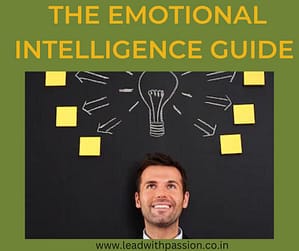
WHAT IS EMOTIONAL INTELLIGENCE?
According to the dictionary definition, Emotional Intelligence is –’’ the capacity to be aware of, control, and express one’s emotions, and to handle interpersonal relationships judiciously and empathetically.’’
Emotional Intelligence helps us to recognize our own as well as others’ emotions, understand their impact, and use that knowledge to guide our thoughts and behaviors.
Our response to changes, challenges, and pressures at the workplace, the way we express our emotions, and interact with others around us influence and impact our lives as well as those of others around us.
In the words of Daniel Goleman, psychologist, and best-selling author, ‘’Emotional Intelligence is the ability to recognize and manage our own emotions as well as the ability to identify, understand, and influence the feelings of others. ‘’
Having said that ,let me explain the difference between Intelligence Quotient and Emotional Intelligence and why Emotional Intelligence is preferred over Intelligence Quotient .
DIFFERENCE BETWEEN EI AND IQ AND WHY EI IS PREFERRED OVER IQ ?
Let us explore some differences between IQ and EQ.
IQ -Is directly related to your intellectual abilities.
It Indicates your capabilities, potential, intellectual abilities, and understanding of others, like how well you learn, memory as well as understanding and applying information, problem-solving.
Some attributes of IQ are :
-
It is a value that indicates a person’s ability to learn, understand and apply information and skills in a meaningful way.
-
Understanding information.
-
A High IQ may be able to learn certain subjects quickly and make connections between ideas that others miss.
-
They often have greater academic success, although they may struggle to find classes that challenge them.
-
There are many individuals with high IQs who seem to be limited in terms of social skills and emotional recognition.
-
An IQ test usually involves a set of standardized questions for which the test taker receives a score.
People with higher IQs can think abstractly and make mental connections more easily.
EQ –Indicates your ability to be self-aware, control, manage and express your emotions in a healthy way, your ability to achieve your personal and professional goals, make well-informed decisions, build healthy relationships with others by being more empathetic and compassionate with them, handle team stress and conflicts productively.
EQ domain includes :
-
EQ is a way to measure how a person recognizes emotions in themselves and others and manages these emotional states to work better as a team
-
Understanding emotions.
-
A high EQ means someone who is self-confident, self-aware, and able to handle difficult emotional experiences
-
People with Higher EQ can often better recognize and control their own emotions, and recognize emotional states in others to adjust their behavior accordingly
-
EQ is difficult to measure and EQ tests were not developed till the 1990s compared to IQ tests, which were developed in the early 20th century
-
An EQ test is difficult to design and administer because it deals with information that is difficult to present as a numerical value. Tests are more objective
Emotional intelligence is like using emotions to think and enhance our reasoning.
Those with high emotional intelligence can manage their emotions as well as use their emotions to facilitate their thinking and understand the emotions of others.
And now a question may arise why employers prefer employees with higher EQ.
WHY DO EMPLOYERS PREFER EMPLOYEES WITH HIGHER EQ?
Over the years, emotional intelligence—also known as EQ—has evolved into a must-have skill.
About 71 percent of organizations are giving more value to emotional intelligence in an employee over IQ.
Employers prefer to hire employees who Possess higher EQ,because :
-
They will be able to achieve their professional goals.
-
Make well-informed decisions.
-
Build better relationships with co-workers and tend to get along better with others because they are more empathetic and compassionate.
-
Perform better as compared to their counterparts
-
Are More likely to remain calm under pressure and therefore respond to coworkers empathetically. Because of this, they can manage team stress and conflicts productively, and increase team productivity and staff retention.
-
They are likely to be more successful compared to their counterparts.
Organisations are valuing people’s skills to succeed in the present times. A high IQ alone is no longer enough.
You need to combine it with a higher EQ to be more successful.
Therefore When there are two candidates with equal amounts of IQ, the one with Higher EQ is hired while job promotion is considered.
The quote by famous emotional intelligence author Daniel Goleman supports this.
“What matters for success, character, happiness, and lifelong achievements is a definite set of emotional skills — your EQ — not just purely cognitive abilities that are measured by conventional IQ tests.” — Daniel Goleman
Emotional intelligence is 90 percent responsible for setting high performers apart from their peers who have similar technical skills and knowledge.
Therefore if you are looking for promotion to the next level or to become a leader, a higher EQ guarantees better career success by giving you an advantage over others in the workforce.
By using your Emotional Intelligence you will be able to designate tasks appropriately to each team member, coach your team, manage stress, resolve conflicts, solve problems, develop a high-performing and cohesive team
This will give you a higher sense of job satisfaction, more opportunities for job promotion, and better relationships with everyone in the workplace.
This is why emotional intelligence is a skill worth investing in.
Having established the difference between IQ and EQ , let us now explore the great benefits of developing your EQ .
18 GREAT REASONS WHY YOU MUST DEVELOP YOUR EMOTIONAL INTELLIGENCE
1. BETTER SELF AWARENESS AND GREATER SELF CONTROL
Higher Emotional Intelligence means better Self Awareness and greater Self Control.
When your self-awareness increases:
-
You are deeply connected with yourself and operate from a place of authenticity.
-
You know your strengths and weaknesses better.
-
You are strongly committed to your growth and development.
-
You will be able to play your role more effectively and be more sensitive toward the feelings of others.
-
Will be more practical, and set realistic goals.
-
It helps you to take feedback and criticism more constructively and use it as an opportunity to grow and be more effective in your job.
-
Higher EI also helps you to stay in self-control. In tough situations like an angry boss or unhappy client, or an enraged employee, it helps you to stay calm and in control of your emotions and prevents the situation from escalating and becoming more negative.
2.ENJOY A SUCCESFUL AND REWARDING CAREER
Employers will seek those out who will perform better, so having a high level of emotional intelligence could potentially open doors to new roles and opportunities.
A high EQ is a desirable trait for employees to have, especially seeing as it correlates to job performance.
People with higher EI can enjoy a successful and rewarding career because:
-
They are more self-aware and can play their role better.
-
They are more responsible and accountable.
-
Have better working relationships, because they are more empathetic and can understand others’ perspectives better and handle them better during challenging situations.
-
They can understand the goals and needs of the organization more widely and deeply.
-
They add better value to the organization by being with their creativity, and innovativeness. In return, they get more perks and promotions, and opportunities to grow.
-
They communicate effectively
-
They outperform their peers because of their skills to resolve conflicts, minimize stress in the workplace, and motivate others well.
3. INCREASED MOTIVATION
Motivation is an internal force that stimulates, fuels, drives us, and influences our performance.
It helps us to reach our full potential.
Motivation is the basic psychological process used to stimulate an individual into action to achieve a desired outcome or goal.
Whether it is losing 100 pounds of weight or getting a promotion at work, without motivation it is impossible to act.
Emotional Intelligence, motivation, and success are interrelated to each other.
Emotional intelligence helps you understand your aspirations and the skills needed to motivate yourself to achieve the desired outcome.
Motivation is comprised of 4 elements :
1 Personal drive to enhance or improve your living conditions.
2 Your commitment towards your goals.
3 Your readiness to take advantage of the opportunities that show up.
4 Your resilience, i.e. to learn from your mistakes and bounce back stronger.
Emotional intelligence is an invaluable management skill for Managers and leaders because they have to be self-motivated and motivate the employees effectively as well for more productivity, higher performance, and achieving the organization’s goals.
4. MORE HAPPINESS
People who have a higher emotional intelligence are generally happier.
They happily cope with the daily demands, challenges, and pressures in the workplace.
This has a positive impact on their well-being as well as on the organisation well being at a bigger level.
Their positive mood impacts the mood in the organizations and people are inspired by their example.
5.HIGHER PRODUCTIVITY
Studies have proven that those with stronger EQ levels can boost workplace productivity because they are more capable of dealing with conflicts, differing values and personalities, and motivating people around them.
They do not get thrown off by negative behaviors and manage themselves as well as enable others to manage themselves more effectively by encouraging them to behave rationally and not impulsively.
6 . CRITICAL FOR ACHIEVING GOALS
If we think of goals as an aim or desired result, we can see how emotional intelligence skills can help one to achieve personal goals and when exercised correctly by leaders and managers, can also help to drive change and progress in the workplace.
The different aspects of EI are interwoven, to achieve self-actualization, we must first achieve motivation, and to achieve motivation we must also be happy in what we are doing.
Without happiness, it is a challenge to reach the levels of motivation required to achieve our goals.
In essence, if we are not motivated how can we expect to achieve our goals?
To produce our best and achieve our goals, we need positive self-regard, heightened emotional self-awareness, and effective problem-solving and decision-making skills.
We must understand clearly what our goals are, and be motivated to accomplish all we can.
7 .POSITIVE WORK ENVIRONMENT
Building a culture where everyone respects and trusts each other creates an environment of support and mutual benefit.
People enjoy and value working with each other in such a positive environment.
It increases collaboration, and retention and establishes goodwill among employees and teams.
EI helps managers and leaders as well as employees to cope with workplace stress, challenges, and conflicts in a healthy manner and boosts the morale of the employees.
Managers /leaders with higher EI, can recognize and deal with negative emotions more positively and lead the conversations to more positive outcomes.
This helps in cultivating stronger mental health for all the employees and a positive workplace environment.
8. HELPS YOU MOVE TO THE NEXT LEVEL
Moving to the next level means going for a higher role and taking up more responsibilities.
E I helps you to exhibit leadership skills and qualities like :
-
Handling a crisis calmly.
-
Demonstrating self-control.
-
Handling stress and conflicts productively.
-
Dealing with frustrated and disappointed clients and stakeholders intelligently.
-
Solving problems systematically.
By demonstrating such skills you stand a better chance to be promoted as a future leader.
9 MAKE EFFECTIVE DECISIONS
EI impacts your personal and professional behaviour and affects your decision-making ability.
Your emotions guide your behaviour and help you in making decisions.
If you let your emotions override you, you will be making misguided decisions based on them.
Superior EI helps you to understand the cause and consequences of your emotions and manage your emotions more maturely.
It aids in, looking at your emotions objectively and avoiding making decisions based on emotional biases.
Higher EI helps in effective problem-solving and objective decision-making.
On the other hand, people with lower EI are more anxious and make poor decisions.
10. HELPS IN MANAGING STRESS PRODUCTIVELY
Stress is a normal part of life and any workplace.
While the organization is growing, there will be new goals and new challenges.
This journey towards the uncertain and unknown can be quite stressful and impact the productivity of the members.
It is likely that if you have a lower EI, you will take up maladaptive behaviors that can increase toxicity in the workplace.
But improving your EI, helps you to :
-
Manage your emotions and responses carefully.
-
Have more control over yourself.
-
Set healthy boundaries.
-
Manage other’s expectations properly
-
Reduce stress in the workplace, by being more empathetic and managing difficult situations more positively.
-
Handle work pressure more maturely and sensibly.
11. INCREASED RESILIENCE
We all experience setbacks, inconveniences, failures, fears, insecurities, and doubts about ourselves from time to time.
Negative thoughts cause us to get derailed, upset, disappointed, and anxious.
Developing your emotional intelligence equips you with competencies that increase your resilience and help you to move ahead more positively.
People with higher emotional intelligence display greater resilience and are less likely to ‘burnout’ or succumb to depression.
All top-performing leaders and managers possess high emotional intelligence which sets them apart from the ordinary ones.
This trait helps them deal effectively with their co-workers and customers.
12.MAKES COMMUNICATION MORE EFFECTIVE
At work, communication is very important.
As a Manager /Leader, You are likely to find yourself communicating with coworkers, direct reports, supervisors, stakeholders, and potential customers.
This leaves a lot of room for interactions where emotions are involved, and emotional intelligence can be the difference-maker in these interactions being positive.
While working together in a team, a person might feel left out, or taken undue advantage of, or denied credit where it is due.
Such feelings might lead them to behave passively or aggressively, which will amplify toxicity in the workplace.
High Emotional Intelligence helps you to manage your emotions before reacting and expressing your feelings more assertively.
It helps you to:
-
Communicate clearly and respectfully.
-
Stay calm in the face of highly emotional reactions of others.
-
Know how to defuse defensiveness and discover the underlying causes of a person’s emotional reactions. This helps you to influence others, to solve problems more effectively, and to maintain a good quality of relationship with everyone.
-
Recognize your emotions-frustrations, disappointment, insecurity etc.
-
Take responsibility for that feeling. Acknowledge why you feel that way.
-
Communicate what you need rather than how you feel. Plan and articulate the problem instead of venting it out in the heat of the moment
This enhances positivity in the workplace.
13. HELPS YOU IN RECEIVING AND GIVING FEEDBACK POSITIVELY
Feedback at the workplace is necessary to improve your performance as well as that of your direct reports and team members to achieve success for the organization.
But the problem with feedback is most people respond to it negatively.
People tend to take it at a personal level instead of understanding the purpose behind it. They either become defensive or bite back with a toxic reaction.
This leads to a hostile environment.
Improving your emotional intelligence helps to avoid reacting and speaking defensively.
It helps you to stay in control of your emotions, reflect on the situation, and turn it into a positive outcome.
EI helps in giving and using criticism constructively and taking it as a learning experience.
You’ll have the chance to improve yourself as well as others and work towards your goals.
14.ENHANCES SOCIAL SKILLS
Social skills are important in organizations and businesses.
With the Internet infiltrating the globe and Post COVID, workplace cultures are changing.
Many organizations are adopting a hybrid work culture.
Remote teams, VA are becoming increasingly in demand.
More time is spent on the internet and virtual meetings and less time is spent in interacting with each other.
This is lowering the social and interpersonal skills of managers, leaders, and their employees.
Good social skills create a good impression on your colleagues and clients.
EI helps you to be socially aware and deal with social situations more seamlessly and effectively.
Social awareness helps you to communicate with your colleagues, listen to them, and make them feel valued, inclusive and engaged.
By socializing and networking you open doors to many opportunities.
This has a positive impact on your career.
15. HELPS IN DEALING WITH CHANGE AND UNCERTAINTY IN A HEALTHY WAY
Change is always uncertain and provokes thoughts of doubt, fear, anxiety and worry.
People seldom take to change sportingly or see it as an adventure.
If the change is sudden or negative, it may make the environment stressful and productivity in the organization plummets.
But an emotionally intelligent person can create a more positive influence and inspire people positively during times of change.
Emotional Intelligence helps in dealing with changes very carefully by accepting it, determining the best response to it, making necessary adjustments, and taking one step at a time.
16.INCREASES SENSE OF RESPONSIBILITY AND ACCOUNTABILITY
At workplace, mistakes are inevitable.
Employees are likely to misinterpret information, projects may fail or deadlines may be missed.
When such setbacks happen, leaders and employees with low emotional intelligence will spend too much time fighting and shifting the blame on others instead of learning from their mistakes and devising a better solution to do differently next time.
The after-effects of setbacks in such situations can show up in many ways like :
-
Leaders, Managers, or Employees may disown responsibility and become more defensive.
-
They may become more aggressive and defensive.
-
They may shift the blame on others instead of finding the real cause.
-
They may avoid communicating with each other to resolve the issue.
-
They will not empathize with each other.
On the other hand, emotionally intelligent people will accept their responsibility for making mistakes.
They will be in control of their emotions, learn from their mistakes and find better solutions to their mistakes.
17.BUILD A STRONG,COHESIVE TEAM WITH BETTER WORKING RELATIONSHIPS
Managers/Leaders who have higher EI can understand the dynamics of the team.
They can understand the pressures their team members face and can take proper care of them and be more helpful towards them.
They are better equipped to understand their challenges, needs, likes, and dislikes and help them grow individually.
This kind of empathy and compassion helps in building a strong and cohesive team.
Members of a team who have a higher EI , can express themselves positively and feel psychologically safe in each other’s company.
They work with an understanding that they are accountable for their emotions and can manage their emotions more productively.
There is a better quality of communication and relationship within the team and each one has a space of their own to grow and develop professionally and personally. They can engage the team fully well.
Having a Higher EQ helps in dealing with negative reactions from others in a positive way and not taking anything personally.
It is instrumental in cultivating healthy relationships with direct reports, colleagues, stakeholders, and clients.
Having healthy relationships brings respect and helps in achieving a better quality of results.
Teams with emotionally intelligent members are great at working together, because :
-
They have good communication skills, trust each other, and value each other’s contributions.
-
They are more receptive to the ideas of their teammates and respond positively and productively to suggestions from others.
-
Each one’s efforts are recognized and rewarded.
-
Better connection between team members ensures higher empathy and compassion among them.
-
Members with higher EI can quickly build trust with each other, as well as rapport. They can understand each other’s feelings.
Because of trust, there is more thoughtfulness and respect towards each other, a sense of responsibility, less control and manipulation, and more autonomy.
This helps members to contribute wholeheartedly towards the bigger good and perform more productively.
-
Emotional intelligence promotes compassion and empathy for others. Knowing how to approach and connect with people aids understanding and builds respect. The ability to demonstrate empathy is key. Practicing empathy helps strengthen relationships, reduce stress and anxiety, and increase understanding in a time when meeting goals and deadlines is often valued more than people.
-
Tied in with positive interactions, emotional intelligence opens up opportunities to make strong connections. Understanding others and coming out of interactions with a more positive attitude can increase your chances of making meaningful connections.
-
This is great for networking, and general interactions at work and also great for your personal life.
18. BETTER LEADERSHIP
Your increased EQ will not only help you manage your work and personal relationships but will also improve your ability to lead and manage others more effectively.
Emotionally intelligent leaders can control themselves, their emotions, thoughts, and actions in a positive manner. Their self-control helps them to behave consistently as they influence and connect with those that they manage. They build trust and work to maintain a positive culture and demeanor among members of their team
Knowing the emotional intelligence of employees can help organizations understand, to some degree, how an employee might manage their emotions and stress, as well as interact with co-workers and clients.
A person’s emotional intelligence might provide insight into which tasks and responsibilities at work are appropriate for them.
Similarly to success, there are many positive traits that might be attributed to effective leadership , like clear communication and confidence. A high EQ may also be beneficial in leadership roles, especially when working with others or on teams.
For leaders and managers, EQ can be essential for:
-
understanding and communicating with co-workers
-
motivating employees and teammates
-
ensuring co-workers and employees are engaged and interested in the work
-
understand co-workers, empathize with them, and know how to best interact with them
-
know how to adjust to meet deadlines
-
take criticism well and improve based on feedback
-
be open to making adjustments and improving the overall workplace
-
intelligent people are frequently optimistic and not easily derailed when facing a challenge. They are hard workers with a growth mindset and persevere in the face of obstacles. They are driven by a sense of ambition to be successful no matter what the situation and their energy is infectious. They focus on purpose and process when things get tough, rather than assigning blame to people and performance
Great leaders understand people; they know how they work, how to influence them, and how to inspire them.
Emotional intelligence will help you to achieve this understanding to be a brilliant leader and guide your team in the right direction.
The skills for becoming more emotionally intelligent may be learned and used to become more effective as a person and as a leader.
Managers and leaders who possess a higher degree of EI can empathize with their employees and identify their motivations and things that discourage them. This helps them to derive intelligent conclusions which helps them to engage them more productively and retain them for longer.
They can understand their team members and set clear expectations with them and get the best out of them.
If a team member is having a tough day – perhaps they’ve had some bad news or their workload is overwhelming – you can use your skills to help lessen their stress levels.
Understanding their emotions, empathizing with them, and lending a helping hand will let you engage with them and make a difference.
Helps to handle those tough conversations-Whether it’s an angry customer or an upset employee, difficult conversations can stir up all sorts of emotions. Having the right skills helps in handling those conversations by emotionally connecting with the other person before finding a resolution.
CONCLUSION
Emotional Intelligence is the key to leading a successful and fulfilling career.
All the reasons that I have shared in the post are great ones to motivate you to develop your emotional intelligence as a New Manager or Leader and I believe you will agree with me in this.
Developing your EQ helps in making many positive interactions and helps you utilize your potential to the fullest.
You will be able to deal with negative situations positively and impact the workplace with your positivity as a leader.
When you are happy and calm your mind works better. You can use your potential better and perform better.
To sum up, enhanced emotional intelligence helps you build stronger relationships with others in the workplace, achieve your goals and make well-informed decisions, and enjoy more success and fulfillment in your career.
So what is your biggest takeaway from this post ? What have you found most useful ?
Share your thoughts below .
Babita Sharma
Leadership Coach
www.leadwithpassion.co.in


